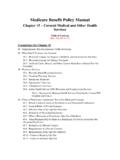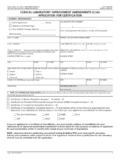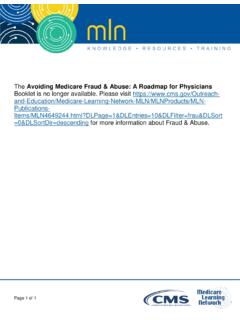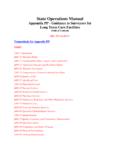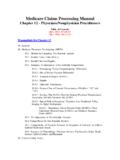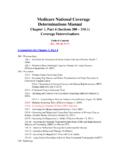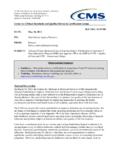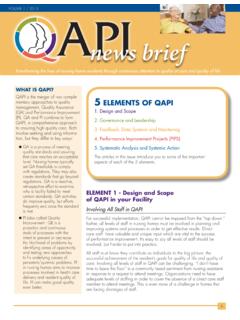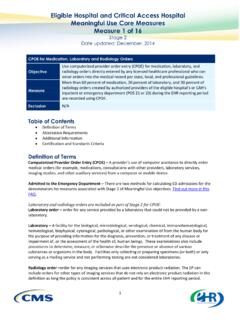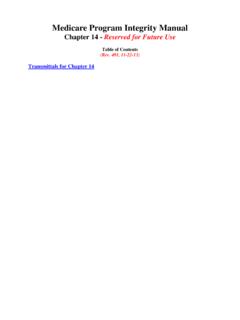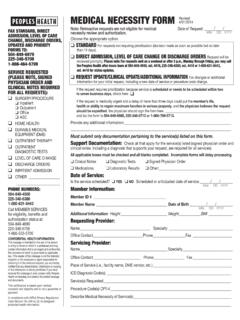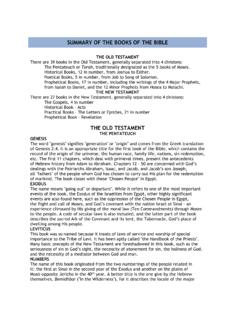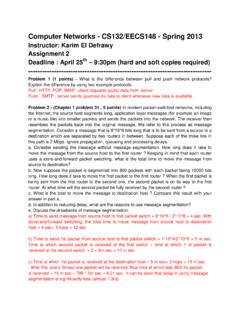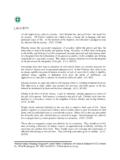Transcription of CMS Manual System
1 CMS Manual System Department of Health & Human Services (DHHS) Pub 100-04 Medicare Claims Processing Centers for Medicare & Medicaid Services (CMS) Transmittal 2282 Date: AUGUST 26, 2011 Change Request 7405 SUBJECT: Clarification of Evaluation and Management Payment Policy I. SUMMARY OF CHANGES: In the Calendar Year (CY) 2010 Physician Fee Schedule (PFS) final rule with comment period (CMS-1413-FC), the Centers for Medicare and Medicaid Services (CMS) eliminated the payment of all Current Procedural Terminology (CPT) consultation codes (inpatient and office/outpatient codes) for various places of service except for telehealth consultation Healthcare Common Procedure Coding System (HCPCS) G-codes. In the CY 2011 PFS final rule with comment period (CMS-1503-FC), CMS recognized the newly created CPT subsequent observation care codes (99224-99226).
2 All references to billing consultation codes in Pub. 100-02, Medicare Benefit Policy Manual , chapter 15 and Pub. 100-04, Medicare Claims Processing Manual , chapter 12 are revised to reflect the current policy on consultation codes. References to billing observation care codes in Pub. 100-04, Medicare Claims Processing Manual , chapter 12, section are revised to account for the new subsequent observation care codes (99224-99226). EFFECTIVE DATE: January 1, 2011 IMPLEMENTATION DATE: November 28, 2011 Disclaimer for Manual changes only: The revision date and transmittal number apply only to red italicized material. Any other material was previously published and remains unchanged. However, if this revision contains a table of contents, you will receive the new/revised information only, and not the entire table of contents.
3 II. CHANGES IN Manual INSTRUCTIONS: (N/A if Manual is not updated) R=REVISED, N=NEW, D=DELETED R/N/D CHAPTER / SECTION / SUBSECTION / TITLE R 12/Table of Contents R 12 for Hospital Observation Services and Observation or Inpatient Care Services (Including Admission and Discharge Services) R 12 for Inpatient Hospital Visits - General R 12 for Initial Hospital Care Services and Observation or Inpatient Care Services (Including Admission and Discharge Services) R 12 Services R 12 Facility Services R 12 Services With Direct Face-to-Face Patient Contact Service (ZZZ codes) III. FUNDING: For Fiscal Intermediaries (FIs), Regional Home Health Intermediaries (RHHIs) and/or Carriers: No additional funding will be provided by CMS; Contractor activities are to be carried out within their operating budgets.
4 For Medicare Administrative Contractors (MACs): The Medicare Administrative Contractor is hereby advised that this constitutes technical direction as defined in your contract. CMS does not construe this as a change to the MAC Statement of Work. The contractor is not obligated to incur costs in excess of the amounts allotted in your contract unless and until specifically authorized by the Contracting Officer. If the contractor considers anything provided, as described above, to be outside the current scope of work, the contractor shall withhold performance on the part(s) in question and immediately notify the Contracting Officer, in writing or by e-mail, and request formal directions regarding continued performance requirements. IV. ATTACHMENTS: Business Requirements Manual Instruction *Unless otherwise specified, the effective date is the date of service.
5 Attachment Business Requirements Pub. 100-04 Transmittal: 2282 Date: August 26, 2011 Change Request: 7405 SUBJECT: Clarification of Evaluation and Management Payment Policy Effective Date: January 1, 2011 Implementation Date: November 28, 2011 I. GENERAL INFORMATION A. Background: In the Calendar Year (CY) 2010 Physician Fee Schedule (PFS) final rule with comment period (CMS-1413-FC), the Centers for Medicare & Medicaid Services (CMS) eliminated the payment of all Current Procedural Terminology (CPT) consultation codes (inpatient and office/outpatient codes) for various places of service except for telehealth consultation Healthcare Common Procedure Coding System (HCPCS) G-codes. In the CY 2011 PFS final rule with comment period (CMS-1503-FC), CMS recognized the newly created CPT subsequent observation care codes (99224-99226).
6 All references to billing CPT consultation codes in Pub. 100-02, Medicare Benefit Policy Manual , chapter 15 and Pub. 100-04, Medicare Claims Processing Manual , chapter 12 are revised to reflect the current policy on reporting evaluation and management (E/M) services that would otherwise be described by CPT consultation codes. References to billing observation care codes in Pub. 100-04, chapter 12, section are revised to account for the new subsequent observation care codes (99224-99226). B. Policy: Effective January 1, 2010, CPT consultation codes were no longer recognized for Medicare Part B payment. As explained in CR 6740, Transmittal 1875, Revisions to Consultation Services Payment Policy, issued on December 14, 2009, physicians shall code patient evaluation and management visits with E/M codes that represent where the visit occurs and that identify the complexity of the visit performed.
7 CMS instructed providers billing under the PFS to use other applicable E/M codes to report the services that could be described by CPT consultation codes. CMS also provided that, in the inpatient hospital setting, physicians (and qualified nonphysicians where permitted) who perform an initial E/M service may bill the initial hospital care codes (99221 99223). CMS is aware of concerns pertaining to reporting initial hospital care codes for services that previously could have been reported with CPT consultation codes and for which the minimum key component work and/or medical necessity requirements for CPT codes 99221 through 99223 are not documented. Providers may report CPT code 99221 for an E/M service if the requirements for billing that code, which are greater than CPT consultation codes 99251 and 99252, are met by the service furnished to the patient.
8 In situations where the minimum key component work and/or medical necessity requirements for initial hospital care services are not met, subsequent hospital care CPT codes (99231 and 99232) could potentially meet requirements to be reported for an E/M service that could be described by CPT consultation code 99251 or 99252. Contractors shall expect changes to physician billing practices accordingly. Medicare contractors shall not find fault with providers who report a subsequent hospital care code (99231 and 99232) in cases where the medical record appropriately demonstrates that the work and medical necessity requirements are met for reporting a subsequent hospital care code (under the level selected), even though the reported code is for the provider's first E/M service to the inpatient during the hospital stay.
9 The general policy of billing the most appropriate visit code, following the elimination of payments for consultation codes, shall also apply to billing initial visits provided in skilled nursing facilities (SNFs) and nursing facilities (NFs) by physicians and nonphysician practitioners (NPPs) who are not providing the federally mandated initial visit. If a physician or NPP is furnishing that practitioner s first E/M service for a Medicare beneficiary in a SNF or NF during the patient s facility stay, even if that service is provided prior to the federally mandated visit, the practitioner may bill the most appropriate E/M code that reflects the services the practitioner furnished, whether that code be an initial nursing facility care code (CPT codes 99304-99306) or a subsequent nursing facility care code (CPT codes 99307-99310) when documentation and medical necessity do not meet the requirements for billing an initial nursing facility care code.
10 In the CY 2011 PFS final rule with comment period (CMS-1503-FC), CMS recognized the newly created CPT subsequent observation care codes (99224-99226). For the new subsequent observation care codes, the current policy for initial observation care also applies to subsequent observation care. Payment for a subsequent observation care code is for all the care rendered by the ordering physician on the day(s) other than the initial or discharge date. All other physicians who furnish consultations or additional evaluations or services while the patient is receiving hospital outpatient observation services must bill the appropriate outpatient service codes. In the rare circumstance when a patient receives observation services for more than 2 calendar dates, the physician shall bill observation services furnished on day(s) other than the initial or discharge date using subsequent observation care codes.
